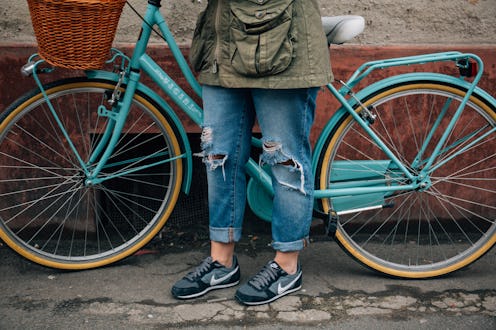Life
The Scientific Case For Biking To Work
I have friends who bike to work every day, rain or shine — something which is, uh, not for me. Who would want to show up to a morning meeting sweaty and panting, hair glued to your forehead? (Not me, is the answer to that one.) But, according to a new study out of McGill University, it may be time I reconsider my stance; it turns out the scientific case for biking to work is even stronger than previously thought.
There’s no denying the obvious benefits of commuting on two wheels. Not only is biking good for you, starting your day with excellent cardio that promotes both mental and physical health, it’s also environmentally more sustainable. If that’s not enough to feel smug about, bikers get to wear all that super cool gear, and throw around words like “fixie” and “slipstream” that gives you instant cred at all the hip coffee shops.
In any event, though, the paper, which will be published in the February 2017 issue of Transportation Research, found that compared to those who drove to work or took public transportation, cyclists had the best odds of arriving on time and feeling energized at the start of the workday. As someone who is habitually late and needs at least two cups of coffee to drag herself out the door, these unexpected perks certainly caught my attention.
The surprising (or maybe not at all surprising, I suppose) results come from a university-wide commuter survey performed in 2013. Lead author Charis Loong and team asked more than 5,000 students, staff, and faculty to described their typical experience commuting to McGill's campus, examining their timeliness and disposition upon arrival. Whether it was stress from being stuck in traffic or delayed on a smelly subway car, results showed that a bad commute can negatively affect a person's day. Drivers were the least likely to feel energized at work, while bus riders were the most likely to arrive late. Cyclists, on the other hand, were shown to have the highest odds of being energized and punctual. Commence the "I told you so"s from all your helmet-wearing buddies.
“They’re much more on time, they feel more energized when they arrive to work or school,” co-author and associate professor at McGill’s School of Urban Planning Ahmed M. El-Geneidy, told Global News. “That’s the main difference that you see.” The study's authors suggest that these results should encourage policy makers to promote cycling as a way to improve performance in school or work, as well as to increase satisfaction of commuters overall. “We need to start having much stronger programs to encourage people to cycle,” said El-Geneidy.
No matter how you get from Point A to Point B, the data also revealed that bad weather was likely to affect punctuality and energy, adding to morning stress. So when it's rainy out, be sure to give yourself plenty of time to get into the office. While the authors do not expect people to battle winter snow and ice on their commuter bikes, past studies have also shown that active modes of transport generally lower stress — so those who live fairly close to the office might want to consider walking during the colder months. And come spring, get ready to break out that tire pump!
